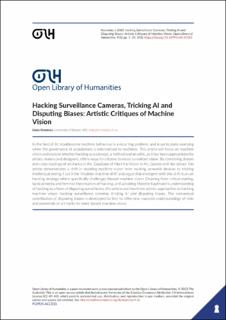| dc.contributor.author | Kronman, Linda Maria Jessica | |
| dc.date.accessioned | 2024-03-25T09:57:04Z | |
| dc.date.available | 2024-03-25T09:57:04Z | |
| dc.date.created | 2024-01-03T17:55:56Z | |
| dc.date.issued | 2023 | |
| dc.identifier.issn | 2056-6700 | |
| dc.identifier.uri | https://hdl.handle.net/11250/3124030 | |
| dc.description.abstract | In the field of AI, troublesome machine behaviour is a recurring problem, and is particularly worrying when the governance of populations is externalised to machines. This article will focus on machine vision and explore whether hacking as a concept, a method and an ethic, as it has been appropriated by artists, makers and designers, offers ways for citizens to resist surveillant vision. By combining distant and close readings of art hacks in the ‘Database of Machine Vision in Art, Games and Narratives’ this article demonstrates a shift in resisting machine vision from hacking sensorial devices to tricking intellectual seeing. I call it the ‘intuition machine shift’ and argue that emergent with this shift is an art hacking strategy which specifically challenges biased machine vision. Drawing from critical making, tactical media and feminist theorisation of hacking, and adopting Mareille Kaufmann’s understanding of hacking as a form of disputing surveillance, this article outlines three artistic approaches to hacking machine vision: hacking surveillance cameras, tricking AI and disputing biases. The conceptual contribution of disputing biases is developed further to offer new nuanced understandings of risks and potentials of art hacks to resist biased machine vision. | en_US |
| dc.language.iso | eng | en_US |
| dc.publisher | Open Library of Humanities | en_US |
| dc.rights | Navngivelse 4.0 Internasjonal | * |
| dc.rights.uri | http://creativecommons.org/licenses/by/4.0/deed.no | * |
| dc.title | Hacking Surveillance Cameras, Tricking AI and Disputing Biases: Artistic Critiques of Machine Vision | en_US |
| dc.type | Journal article | en_US |
| dc.type | Peer reviewed | en_US |
| dc.description.version | publishedVersion | en_US |
| dc.rights.holder | Copyright 2023 The Author(s) | en_US |
| cristin.ispublished | true | |
| cristin.fulltext | original | |
| cristin.qualitycode | 1 | |
| dc.identifier.doi | 10.16995/olh.10181 | |
| dc.identifier.cristin | 2220241 | |
| dc.source.journal | Open Library of Humanities | en_US |
| dc.source.pagenumber | 1-35 | en_US |
| dc.identifier.citation | Open Library of Humanities. 2023, 9 (2), 1-35. | en_US |
| dc.source.volume | 9 | en_US |
| dc.source.issue | 2 | en_US |

